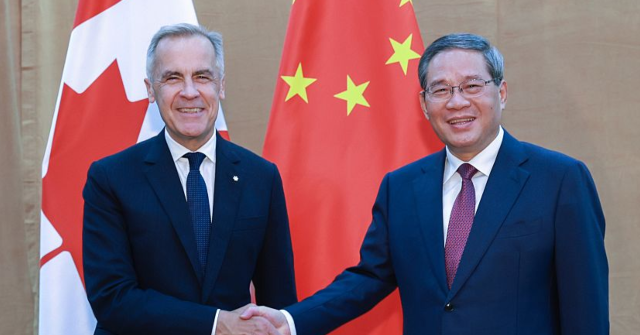Canadian Prime Minister Mark Carney met with Chinese Premier Li Qiang on the sidelines of the U.N. General Assembly (UNGA) in New York City on Tuesday.
Carney and Li discussed repairing relations between the two countries, which have been strained ever since Canada arrested Chinese Communist Party aristocrat Meng Wanzhou in 2018.
China took several Canadians hostage and was ultimately able to pressure Canada, and President Joe Biden, into releasing Meng and dropping the fraud and sanctions-evasions charges brought by the United States against her.
Li said after meeting with Carney that China is “willing to make more active and practical efforts with Canada to promote further improvement of bilateral relations,” as reported by Chinese state media.
“The Chinese premier said that China hopes the Canadian side can adopt a correct perception of China, and respect each other’s core interests and major concerns to cement the political foundation for the development of bilateral cooperation and ties,” said China’s state Xinhua news service.
Bloomberg News reported on Tuesday that Carney seeks to rebuild relations with China that grew worse under his predecessor Justin Trudeau, in part because “U.S. protectionism has brought Canada’s need to diversify trading relationships into sharp focus.”
Carney’s resistance to Chinese influence also crumbled under China’s punitive tariffs on canola, pork, and seafood, which Beijing imposed after Canada joined the United States in using levies to thwart Chinese product dumping.
Canada imposed 100 percent levies on Chinese electric vehicles (EVs) and 25 percent on steel and aluminum. Bloomberg suggested removing those tariffs now could “threaten delicate trade talks with the U.S., ahead of an upcoming review of U.S.-Mexico-Canada Agreement.”
Chinese Academy of Social Sciences research fellow Lu Xiang sneered to Chinese Communist Party paper Global Times on Wednesday that Canada must “resist third-party interference and avoid undermining China-Canada relations to appease another country,” a reference to the Trump administration’s desire for Canada to stand with the United States against Chinese product dumping.
Carney said ahead of his meeting with Li that Canada would be comfortable forging partnerships with China on energy, manufacturing, and climate change, while avoiding areas where Canada saw a threat to its national security. Carney was effusive in his praise for China’s engineering skills and its purported ability to control emissions, even though China is the world’s worst polluter.
China’s tariffs on canola appear to be the straw that broke Carney’s back. Even as the Canadian prime minister was sidling up to Li, Canadian Foreign Minister Anita Anand was struggling to develop “alternative trade routes” for canola, especially with Pakistan, one of the world’s largest canola importers.
The Global Times published an editorial on Wednesday that jeered Canada for working too closely with the United States, and played up the pressure Carney is facing from western Canadian provinces that do a great deal of business with China.
The editorial treated Canadians like fools for daring to oppose China’s effort to take control of their EV market, and played up President Donald Trump’s tariffs against Canada as an opportunity for Beijing to draw Ottawa further into its orbit:
Last October, in a bid to show loyalty, Canada blindly followed Washington in imposing a 100 percent tariff on the import of Chinese electric vehicles, violating the principles of bilateral free trade and straining China-Canada economic ties. Yet this gesture failed to win it any favor. The U.S. has slapped tariffs on numerous Canadian products, even deriding Canada as “America’s 51st state.”
The humiliation galvanized Canada’s public boycotts of US goods and travel, and Canadians have increasingly begun to see the volatility and unreliability of their traditional ally, leading to reflection on the risks of excessive dependence on the U.S.
Blindly following Washington while alienating China — Canada’s second largest trading partner — clearly runs counter to Canada’s long-term interests and harms its businesses and citizens. As a result, more Canadian politicians are voicing firm calls for “diversifying trade away from the U.S.”
The Global Times instructed Carney to “move beyond the policy logic of the U.S. and forge a new, pragmatic path” on relations with China, even as it acknowledged Canadian security and economic ties with the U.S. would be difficult to break. Naturally, the Global Times had nothing to say about China’s use of punitive tariffs to bend Canada to its will.
Columnist John Ivison of Canada’s National Post on Wednesday lambasted Trump for doing everything possible to push Canada into China’s arms, but noted the “perils” of becoming more dependent on trade with China, which uses trade as an “instrument of state-directed growth.”
Ivison noted this “gives Chinese companies an advantage over their competitors unless it is met by similar industrial policy.”
The National Post columnist saw signs that Canada is preparing to sacrifice its EV industry to China as the cost of doing more business with Beijing and winning relief from those crushing Chinese tariffs on canola, pork, and seafood. Among other indicators, Canada’s Liberal Party lawmakers have been issued talking points that American tariffs are a bigger threat to the Canadian automotive sector than Chinese product dumping.
Carney’s opponent in the last election, Conservative leader Pierre Poilievre, warned that Carney’s financial ties to China would come back to haunt Canadians if they made him prime minister. Poilievre accused Carney of flying to Beijing for “secret talks” with the Bank of China to secure a huge loan for his Brookfield Asset Management corporation last year when Carney was the head of Trudeau’s task force on economic growth.
“How do we know he’s not going to act against our interests in favor of his financial interest? Why didn’t he stand in front of a microphone and confess to Canadians that he owes the Chinese Government that kind of money?” Poilievre wondered.
Read the full article here
